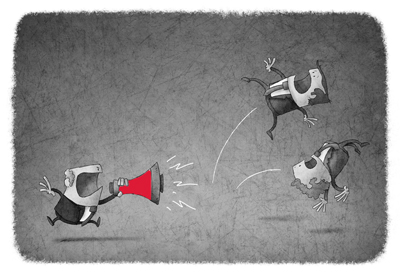Being an effective communicator is a crucial leadership skill. An entire group, company or organisation will rise or fall to the communication standards of its leaders. A 2009 study by Siemens Communications and SIS International Research found that a company with 100 employees loses an average of 17 hours per week addressing inefficient communication, which could cost the company up to $525,000 every year.
Leaders spend a good portion of their day interacting with others, whether face-to-face, in small meetings or at a podium in front of many. That means you have plenty of opportunities to watch out for and correct these common communication mistakes. Here are six of them to avoid:
1. Focusing only on yourself
If your attention is always on your own message, thoughts and feelings, you will fail to connect to your audience, whether one or many. In a face-to-face exchange or small group, allow ample time for others to be heard, and be open to how their input may change your own beliefs, actions and message.
2. Being unprepared for your leadership communication responsibilities
Every time you speak publicly you represent your company. The more organised and prepared you are, the more you will be able to accommodate unpredictable questions, comments or situations and still remain calm and effective.
3. Hiding behind inappropriate communication methods
You may feel more comfortable sending an email or leaving a voicemail, but that may not be the best approach for a particular message. Consider the responders’ feelings and how the message may be perceived by others, including the public, if applicable.
4. Putting no attention on how you deliver your message
Reading or reciting without varying your inflection or tone makes it sound like you’re disconnected from the message you’re delivering. You may think you’re being polished and professional, but this kind of lifeless delivery puts a barrier between you and your audience and can make you sound like a robot.
5. Saying statements as questions
A rise in inflection at the end of a sentence makes it sound as though you’re begging for validation or questioning your own message. People may have a hard time trusting you if you don’t seem to believe what you’re saying.
6. Using nervous habits such as rambling, filler words, unnatural gestures or fidgeting
Record a video of yourself leading a meeting or giving a speech or presentation. This will reveal your most common issues, and then you can pay closer attention to when you’re tempted to use them. Deep breathing and other relaxation techniques can help calm your nerves and be more present in the moment.
If you’re not inciting the respect, motivation, productivity or results you desire from others, then consider whether one of these leadership communication mistakes is to blame.
With thanks to www.crsco.com for inspiration for this post.
